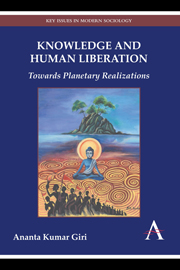Book contents
- Frontmatter
- Contents
- Preface
- Acknowledgments
- Foreword
- Introduction: The Calling of Transformative Knowledge
- Part I Nurturing the Garden of Transformational Knowledge: Roots and Variants
- Part II Rethinking Knowledge
- Part III Aspirations and Struggles for Liberation: Towards Planetary Realizations
- 12 Rethinking the Politics and Ethics of Consumption: Dialogues with “Swadeshi” Movements and Gandhi
- 13 Swaraj as Blossoming: Compassion, Confrontation and a New Art of Integration
- 14 Civil Society and the Calling of Self-Development
- 15 The Calling of Practical Spirituality: Transformations in Science and Religion and New Dialogues on Self, Transcendence and Society
- 16 Spiritual Cultivation for a Secular Society
- 17 Cosmopolitanism and Beyond: Towards Planetary Realizations
- Afterword
- Advance Praise
13 - Swaraj as Blossoming: Compassion, Confrontation and a New Art of Integration
from Part III - Aspirations and Struggles for Liberation: Towards Planetary Realizations
Published online by Cambridge University Press: 05 May 2013
- Frontmatter
- Contents
- Preface
- Acknowledgments
- Foreword
- Introduction: The Calling of Transformative Knowledge
- Part I Nurturing the Garden of Transformational Knowledge: Roots and Variants
- Part II Rethinking Knowledge
- Part III Aspirations and Struggles for Liberation: Towards Planetary Realizations
- 12 Rethinking the Politics and Ethics of Consumption: Dialogues with “Swadeshi” Movements and Gandhi
- 13 Swaraj as Blossoming: Compassion, Confrontation and a New Art of Integration
- 14 Civil Society and the Calling of Self-Development
- 15 The Calling of Practical Spirituality: Transformations in Science and Religion and New Dialogues on Self, Transcendence and Society
- 16 Spiritual Cultivation for a Secular Society
- 17 Cosmopolitanism and Beyond: Towards Planetary Realizations
- Afterword
- Advance Praise
Summary
Communication is always ambiguous and always an expression of latent violence. But when this description of violence is ontologized, when one sees “nothing but” violence in it, one misses the essential point, namely, that the critical power to put a stop to violence without reproducing it in new forms can only dwell in the telos of mutual understanding and our orientation to this goal.
-Jürgen Habermas, The Divided West (2006, 18)Compassion brings inner strength, and compassion also brings truth… Compassion involves a feeling of closeness to others, a respect and affection that is not based on others' attitudes towards us. We tend to feel affection for people who are important to us. That kind of close feeling does not extend to our enemies – those who think ill of us. Genuine compassion, on the other hand, sees that others, just like us, want a happy and successful life and do not want to suffer. That kind of feeling and concern can be extended to friend and enemy alike, regardless of their feelings towards us. That's genuine compassion.
—The Dalai Lama, The Middle Way: Faith Grounded in Reason (2009, 2–3)This implies integration in the sense of all relating to all, as opposed to fragmentation, and holism, the use of many faculties in all parties, as opposed to segmentation.
—Johan Galtung and Graeme Macqueen, Globalizing God: Religion, Spirituality and Peace (2008, 18)An Introduction and Invitation
Hind Swaraj is an open dialogue in which not only the Reader and Editor speak to each other with compassion but all of us, the whole humanity, are invited to join this journey of co-walking and the realization of fuller humanization and divinization (Gandhi 1938).
- Type
- Chapter
- Information
- Knowledge and Human LiberationTowards Planetary Realizations, pp. 219 - 232Publisher: Anthem PressPrint publication year: 2013



